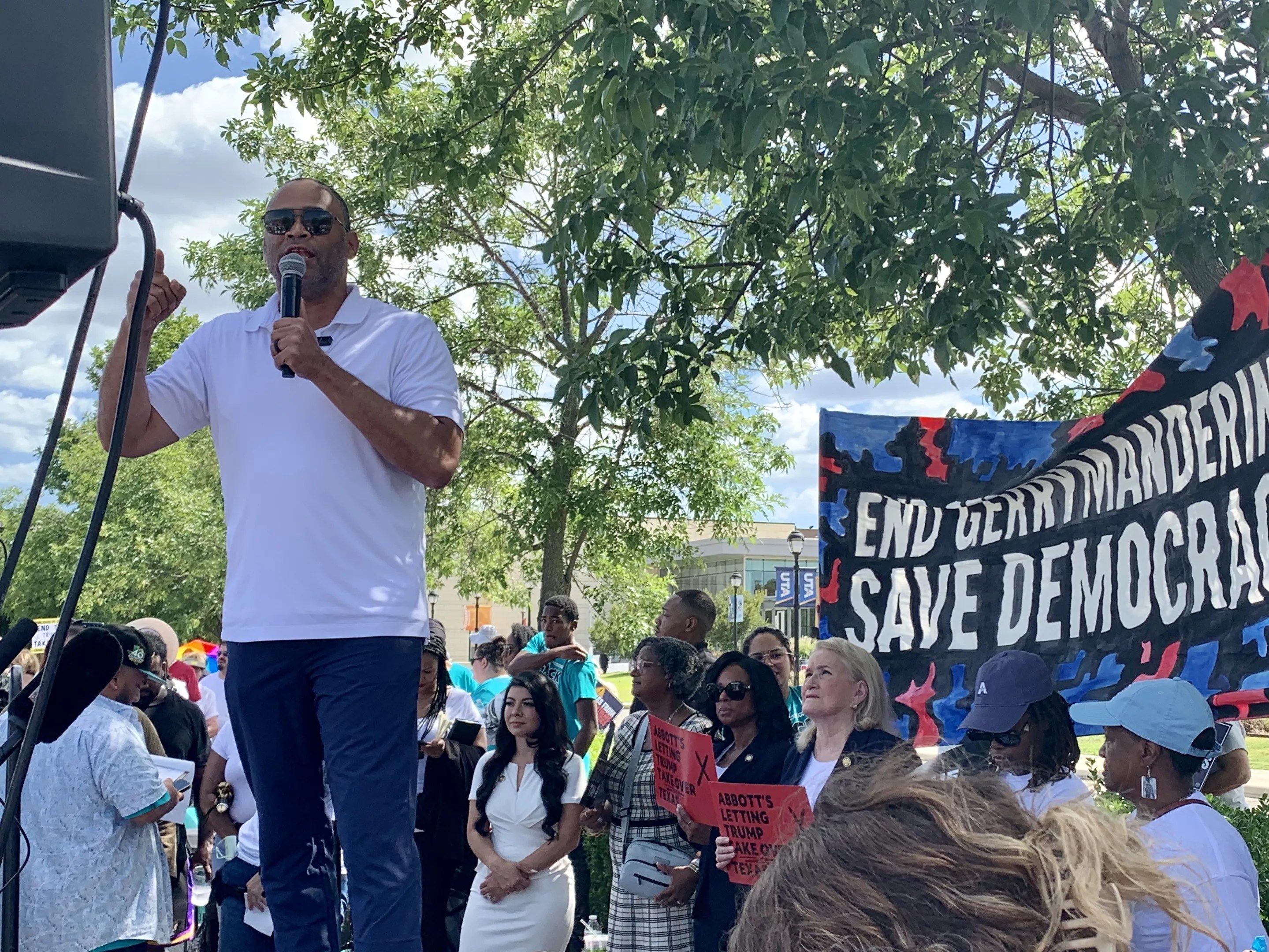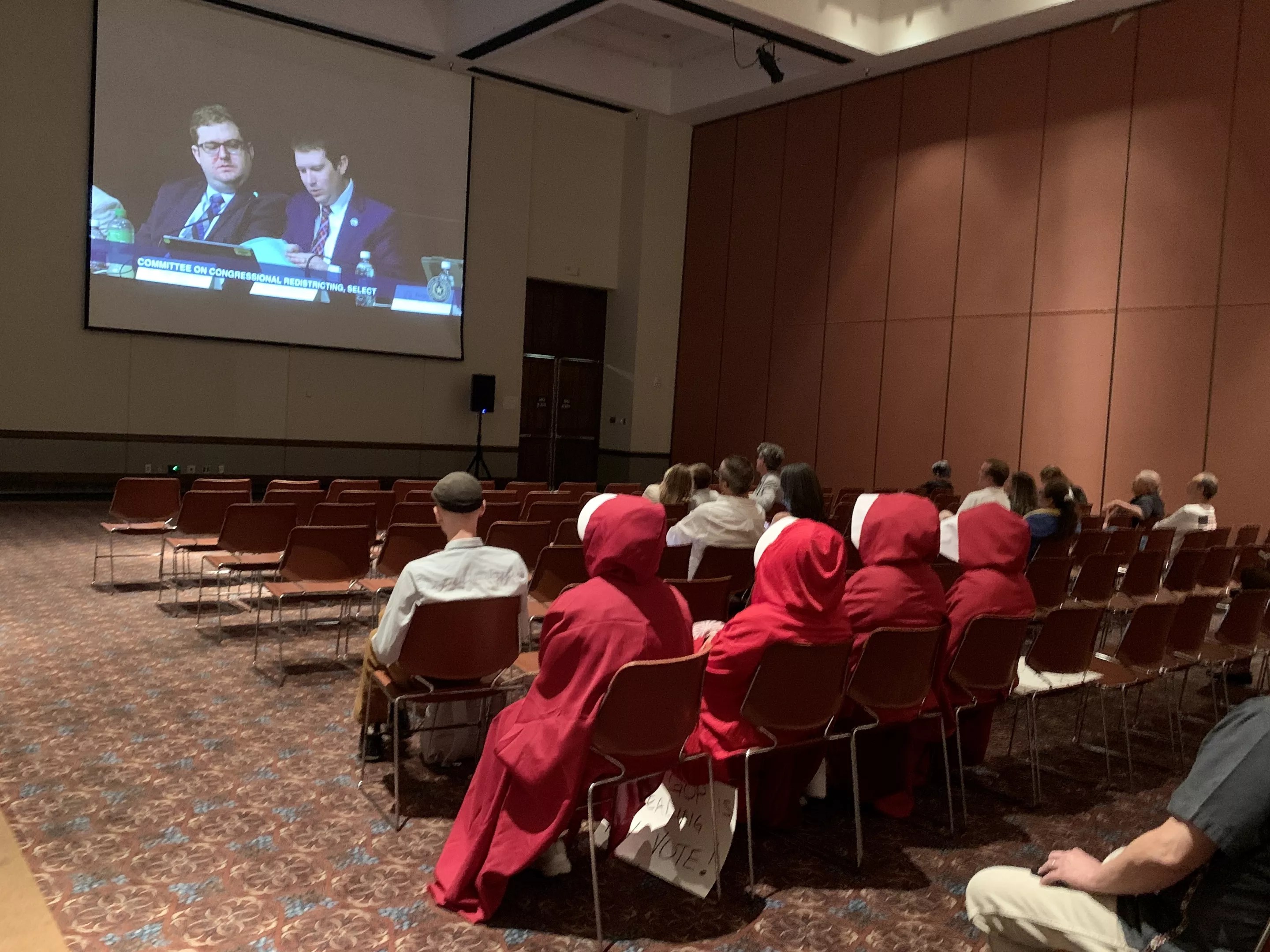
Emma Ruby

Audio By Carbonatix
The first mistake made by Cody Vasut, a Republican representative from Angleton who chairs the House Redistricting Committee, was in addressing the man who held a large poster of President Donald Trump cozied up beside Jeffrey Epstein. Emblazoned across the image in size 2,000 font: PEDO PALS.
Attempting to call the final of three hearings on the proposed mid-decade redrawing of Texas’ electoral maps into order, Vasut reminded the crowd of more than 425 of the House committee rules, which include a provision banning signs from being held.
“We follow the rules, here,” Vasut said, urging the man to lower the poster.
That line didn’t go over well.
Of the hundreds of North Texans who gathered at the University of Texas at Arlington Monday evening for the redistricting hearing, the vast majority made it clear they are vehemently opposed to what they see as a transparent power grab by the president of the United States.
Redistricting is typically done at the start of each decade as new census data becomes available. The maps now under question were approved by Texas Republicans in 2021, after the 2020 census was conducted. However, a mid-decade redistricting attempt was added to the Texas Legislature’s special session agenda by Gov. Greg Abbott earlier this month – not because the Department of Justice asked, but because President Donald Trump did, the Texas Tribune reports.

A crowd gathered outside of UT Arlington Monday afternoon ahead of the hearing on redistricting.
Emma Ruby
Earlier this month, Trump told reporters he intends to use redistricting to flip five Texas seats in favor of Republicans. That move would help shore up his Republican majority in the U.S. House of Representatives come the 2026 mid-term elections. Four Texas Congressional districts held by Democrats of color will be the testing grounds for that pursuit.
“A line has been drawn in the sand,” said Congressman Marc Veasey Monday afternoon ahead of the hearing. Veasey’s North Texas district, CD 33, was singled out in the DOJ’s letter as one that should be redrawn. “If we don’t take control of this, [Republicans] will. And they will wipe out everything that we have worked for.”
The auditorium where Monday’s hearing was held hit capacity 45 minutes before the meeting began. Another 400 or so people formed long, snaking lines in the building’s entryway, hoping to get into the auditorium. Eventually, that waiting area, too, reached capacity. Testimony was limited to five hours, and the meeting did not gavel to a close until 11 p.m.
A Testy Hearing
Before testimony began, some of the two-dozen House members who sat in rows on a stage at the front of the auditorium turned to Vasut and asked, “Where are the maps?” Surely, maps of the proposed redistricting would be helpful to make the all-night meeting productive.
The Texas House Redistricting Committee, its staff, and its Senate counterpart have not seen any officially proposed maps of what the amended congressional districts could look like. Veasey, the congressman whose seat is in flux, has not seen a map of what his district could look like in a few weeks if the redistricting process reaches the final stages of approval.
ARLINGTON, Texas – Hundreds wait outside an ongoing a Texas House Redistricting Committee hearing about proposed changes to the state congressional map. A proposed redraw is expected to be released in the coming days. pic.twitter.com/0x73hYecTe
— Ed O'Keefe (@edokeefe) July 28, 2025
Vasut did say he’s contacted the Department of Justice to ask for clarification on what is expected of the redistricting committee. He received an “out of office” response email.
Texas’ electoral maps are already drawn to support the election of Republican candidates, but the DOJ’s letter to Texas leaders claims that a recent ruling by the 5th U.S. Circuit Court of Appeals overturns the precedent established by the Voting Rights Act that calls for the creation of majority-minority coalition districts, which protect the voting power of minority communities.
Experts have disputed the DOJ’s interpretation of the circuit court’s ruling, and noted that earlier this summer, state leaders swore under oath in a federal court that Texas’ congressional district boundaries were drawn “race blind,” testimony that those same leaders are now contradicting. According to The Texas Tribune, some plaintiffs involved in ongoing litigation against the 2021 maps have asked for testimony in the case to be reopened to consider that new contradiction.
If Texas moves forward with a map redrawing that dilutes the voting power of communities of color, legal challenges will likely follow.
“It’s curious to me that there are only communities of color being targeted,” said Rep. Jon Rosenthal, a Democrat from Cypress and the vice-chair of the redistricting committee, at the hearing’s start. Turning to address the crowd, he added, “This right here is a racist attack. … It’s about erasing your voices.”
He was met with cheers and applause, and over the next few hours, Texans’ testimonies echoed Rosenthal’s sentiment.
“Reject what’s coming from Washington D.C. and ensure our voices are heard,” asked Frederick Douglass Haynes III, a pastor with Southern Dallas’ Friendship-West Baptist Church. “Please do not erase the voices of the voiceless. … I am begging you, please stand on the right side of history.”
Known for his skill as an orator, Haynes’ remarks earned a standing ovation so raucous that Vasut, who’d met interruptions from the crowd with a gavel and a call to order, gave up his hammering within seconds and allowed the cheering crowd to wear itself out.

A group of women wearing outfits inspired by the book and TV show The Handmaid’s Tale watch the hearing from an overflow room.
Emma Ruby
One speaker spoke in favor of redistricting, stating that now is the time to embrace Republican leadership. Rich Stoglin, who identified himself as the president of the Frederick Douglass Republicans of Tarrant County, was booed throughout his testimony. Audience members occasionally yelled out “shame,” “fascist,” and “he not like us” – a reference to the diss track by rapper Kendrick Lamar.
As the hearing came to an end, committee members once again badgered Vasut about when maps would be provided for their review. Vasut said he is not sure if he will work on a map himself or if a map may be submitted. Democratic committee members asked whether Vasut had heard of a map coming from either the governor’s office or the White House, and he said he had not been made aware of plans for either body to submit a suggested map.
Redistricting is usually a process that takes months. As one of 18 items on the Legislature’s special session agenda, the committee is working on an expedited timeline so short it seems impossible to some. Vasut vowed that once a redrawn map is available, more hearings will be held, but state Sen. Royce West, a Democrat from Dallas who testified at the hearing’s start, questioned whether the committee will have time to host regional listening sessions like Monday’s.
Special sessions can last up to 30 days, and the Legislature’s session started on June 21. The clock is ticking.
Cindy Rocha, a Fort Worth resident, told the committee she worries that the redistricting could add to the confusion that already surrounds the voting process in Texas, contributing to an overall culture of voter disenfranchisement.
“Texas is already one of the hardest places in the nation to register to vote and then to vote,” she said. “Please do not add additional confusion by redrawing districts.”